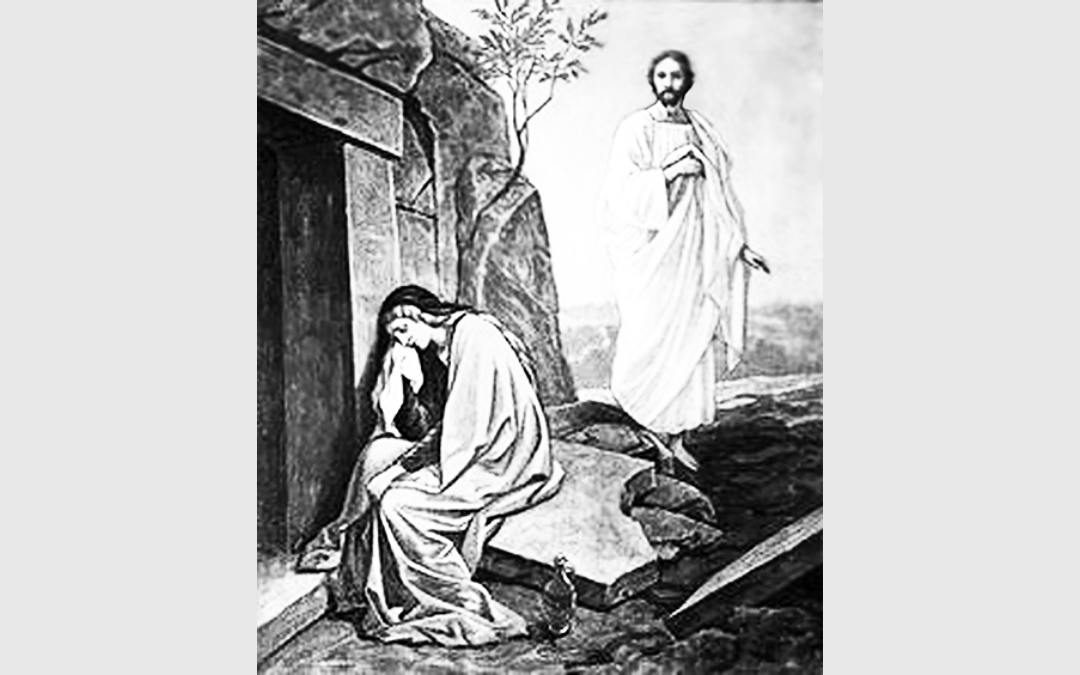By John R. Ecob D.D.
Was there ever a more Godly woman than Mary, the mother of our Lord? She was chosen by the Holy Spirit of God to be the person through whom God would bring His only begotten Son into the world.
Mary carried the Son of God in her womb, nursed Him in infancy, taught Him in His childhood and ministered to Him throughout His life. She saw the miracles Jesus performed and in Christ’s death, Mary stood boldly while the crowd sat to watch her son writhing in agony on the cross until John took her to his own house at Jesus’ request. When Mary first saw Jesus risen from the tomb we are not told but she was present with her other children on the day of Pentecost as they experienced the outpouring of the Holy Spirit. There is no mention of her four sons and several daughters standing with her in her hour of greatest agony. She stood with a few friends, unashamed to be a disciple of the One being ridiculed on the cross.
Mary’s story began when Gabriel told her that she was “highly favoured” and that “the Lord is with thee: blessed art thou among women” (Luke 1:28). She was also told not to fear for “thou hast found favour with God”.
Immediately after this young Jewish girl became pregnant she visited her aged cousin Elizabeth and was told that she was the “mother of my Lord!” Elizabeth was 6 months pregnant with John the Baptist at the time and John leaped in her womb and Elizabeth was filled with the Holy Spirit just because they were in the presence of the unborn Christ. Thus we understand that Christ was a living person from the moment of conception.
Many times Mary must have meditated on Isaiah’s prophecy:
Therefore the Lord himself shall give you a sign; Behold, a virgin shall conceive, and bear a son, and shall call his name Immanuel (Isaiah 7:14).
Mary was told by the angel Gabriel not to fear but there was much that would make her fear. She knew that the baby she bore was without an earthly father. The promise Gabriel gave was that the infant she carried was indeed the Son of God; Immanuel; “God with us”, but who would believe her?
This Godly girl, a descendant of David, faced great trials and misunderstandings from the very beginning. She was espoused (engaged) to be married to Joseph who was a Godly man. She had to break the news to him that she was pregnant. According to the law of Moses, Joseph could divorce her and she would be shamed but the angel Gabriel came to Joseph and assured him that Mary’s child was by the Holy Spirit and he must not put her away. Nevertheless people would not understand and she bore the stigma of becoming pregnant out of wedlock.
Kindly, Joseph took Mary as his wife to live in his house but they were not joined in marriage until after Jesus was born. While Mary was expecting her first child the decree came for all the world to be taxed and so Joseph, who was also from the line of David, returned to his family home at Bethlehem with his “espoused wife”. Legally they were married but they were still only “espoused”: the marriage had not been consummated.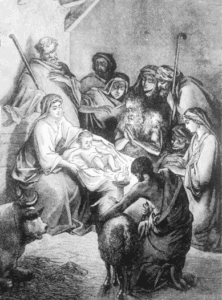
Many tongues have wagged about Mary accusing her of infidelity. Even today there are those ungodly who accuse her of premarital sex and some even suggest she was a prostitute for Roman soldiers. But what could a young Jewish maid say to such accusations? Would they believe that Gabriel, who stands in the presence of God, had visited her to inform her that among all the women in the world, she had been chosen to be the mother of our Lord? Who would believe her? Joseph did not believe her until Gabriel came to him with reassurances and we are not told of her parents reaction. Did they disown her? All Mary had to reassure her was the word of Gabriel who said that the child she would bear would be the “King of Israel” and “the Son of the Highest”. Years must pass and only time would tell if she was speaking the truth.
A number of things happened to reassure Joseph and Mary that the words of Gabriel were genuine. When Jesus was born in Bethlehem shepherds suddenly appeared at the stable door claiming angels had appeared and directed them to this very spot. They had been told that this new-born babe was “a Saviour which is Christ the Lord” (Luke 2:11) and they left telling everybody of their experience. Mary quietly listened to all that these enthusiastic shepherds had said and “pondered them in her heart” (Luke 2:19). She made no attempt to tell them of how the angel Gabriel had come to her.
Eight days later, Joseph and Mary took Jesus to the Temple to be circumcised according to the law and out of the crowd there stepped an old prophet named Simeon:
Then took he him up in his arms, and blessed God, and said, Lord, now lettest thou thy servant depart in peace, according to thy word: For mine eyes have seen thy salvation, Which thou hast prepared before the face ofall people; A light to lighten the Gentiles, and the glory of thy people Israel (Luke 2:28-32).
Just at that very moment Anna, the eighty-four-year-old prophetess appeared and spoke similar words about the babe and she went and told all the people who “looked for redemption in Jerusalem”. She told them she had seen the promised Messiah!
A year or more later while Joseph was still in Bethlehem with the family, one night some very important Gentile men suddenly appeared at the door of the house in which he lived. They had come a great distance on camels with gifts for the “King of the Jews” who they claimed had been born in Bethlehem. These were wealthy wisemen from far away Babylon and they produced expensive gifts for the “young child”: “gold, frankincense and myrrh”.
Unfortunately, these wealthy Gentiles had enquired at Jerusalem as to where the King of the Jews would be born and King Herod had asked to be informed of the baby’s whereabouts. But God warned these wealthy “wise men” not to return to Herod so they returned home “another way” and the angel of the Lord warned Joseph in a dream telling him to flee into Egypt with the young child to escape the sword of Herod’s soldiers.
If Joseph had any doubts about Jesus being the Christ of God they must have been dispelled. The Shepherds; Simeon and Anna and now the wise men from a far off country had all independently testified that this child was the Son of God and the Saviour of the world and finally the Angel of the Lord was sending them to Egypt to escape the sword of Herod. News of the slaughter of the infants in Bethlehem reached them in Egypt confirming the angel’s instruction to flee.
What must Mary have thought? She had lived all her life in Nazareth with little evidence that Jesus was the Son of God. Nazareth was three days journey to the north of Bethlehem but she had been compelled to come to Bethlehem by order of the Roman powers just when her first-born baby was about to arrive and this fitted perfectly with the prophecy of the prophet Micah:
But thou, Bethlehem Ephratah, though thou be little among the thousands of Judah, yet out of thee shall he come forth unto me that is to be ruler in Israel; whose goings forth have been from of old, from everlasting (Micah 5:2).
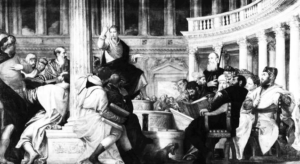
After Jesus was born, Mary had consummated her marriage with Joseph and bore four sons and several daughters (Matt.13:55). After Herod had died Joseph and the family settled back in Nazareth where Jesus grew up a normal Jewish boy with his four brothers and sisters that were born in Nazareth. At the age of 12 Jesus was taken to Jerusalem for His first Passover feast of the Jews. It was obligatory for all Jewish boys to attend the Temple three time each year beginning at the age of 12.
After the Passover, the pilgrims began their three-day journey to return to Nazareth and after one day, Mary and Joseph discovered that Jesus was not among the company. We can only assume that any other younger children of Mary had at this time been left at Nazareth in the care of family members.
We hear nothing about Jesus’ family throughout the years as Joseph raised his family. As a child Jesus appeared to be just an ordinary child in a Jewish family. We do not hear of any miracles because we know that Jesus’ first miracle was after He began His ministry when he turned the water into wine at Cana (John 2:1-11). All the extraordinary events that occurred at Jesus birth at Bethlehem and Jerusalem and in the land of Egypt would be concealed from the folk at Nazareth. It was a family secret but Mary could not forget the prophecies of what the future held for her firstborn son. She “kept all these saying in her heart” (Luke 2:51).
Many times Mary’s thoughts must have raced back to the words of Gabriel and especially the prophecy of Simeon when he said
unto Mary his mother, Behold, this child is set for the fall and rising again of many in Israel; and for a sign which shall be spoken against; (Yea, a sword shall pierce through thy own soul also,) that the thoughts of many hearts may be revealed (Luke 2:34-35).
If Jesus was going to sit on the throne of His father David and reign for ever why did Simeon prophesy that He would be “spoken against”? And what did he mean when he said, “a sword shall pierce thy own soul?”
Jesus grew up as any normal boy but He was special. At age 12 when Jewish boys began to attend the annual feasts in Jerusalem, He had indicated to Mary that the Temple was His Father’s house and that He must be about His Father’s business! Mary knew who Jesus’ Father was and it was not Joseph, but others would not realize the implications so Mary “kept all these sayings in her heart” (Luke 2:51). In her mind she would be wondering, How would a sword pierce her soul? What sorrows lay ahead for her?
At some time, perhaps when Jesus was about 15 or 20 years of age, tragedy struck the family and Joseph died. Jesus, as the firsborn, would naturally take over the leadership of the family working each day in the carpenter’s shop to provide for the family. Each sabbath He attended the synagogue in Nazareth and read the scriptures when required. No miracles were performed during those years and there was nothing about the Lord’s life that appeared different except that he was a righteous man. No foul words were used; no deceit was practiced and in every way He was compassionate, responsible and Godly.
One day news came to Nazareth that John the Baptist was preaching in Judea by the River Jordan; He was calling the people to repentance. Multitudes from Jerusalem went down to the Jordan River and were baptized of John to signify they were truly repenting of their old life intending to walk a new way of life with God. John was the son of Mary’s cousin Elizabeth but John had been raised in the wilderness of Judea. His parents were both elderly when he was born and no doubt died many years before. John had lived a secluded life and had never met Jesus.
Mary had stayed with John’s mother Elizabeth for 3 months when Elizabeth was only 6-months pregnant with John and Elizabeth had at that time proclaimed that Mary was “the mother of my Lord!” (Luke 1:43). No doubt Elizabeth had confided in Mary about the prophecies surrounding John and how he was to be the “messenger” who would go before the Lord to “make ready a people prepared for the Lord” (Luke 1:17). About 30 years had passed and the two families had drifted apart. Mary probably never saw John after he was born but she knew he was to be the herald of Messiah and when suddenly she heard of John preaching, “Prepare ye the way of the Lord” and of multitudes flocking to the Jordan River to hear him preach, she knew her Son was soon to be revealed for who he was; the Lamb of God, the King of Israel and the Son of God!
About this time, when Jesus was about 30 years of age, He went down to Jordan where John was baptizing. They had never met but when Jesus asked John to baptize Him, John said
I have need to be baptized of thee!
When Jesus came up out of the water the Holy Spirit descended like a dove on Jesus and John declared that God had told him,
Upon whom thou shalt see the Spirit descending, and remaining on him, the same is he which baptizeth with the Holy Ghost (John 1:33).
That same day John saw Jesus walking nearby and he declared,
Behold the Lamb of God which taketh away the sin of the world!
and
This is the Son of God! (John 1:34).
John was born 6 months before Jesus yet he said:
This is he of whom I said, After me cometh a man which is preferred before me: for he was before me (John 1:30).
Jesus was about 30 years of age when He began His public ministry. Each year Jesus had been to Jerusalem for the three great feasts; Passover, Pentecost and Tabernacles. After Jesus began to preach He went to Jerusalem for the feast of Passover and found the money changers exchanging Roman currency into Temple money, and traders selling animals in the Temple. Jesus took a whip and drove the animals out of the Temple and overturned the tables of the money changers declaring that they had made His Father’s house a den of thieves.
Jesus’ Miracles
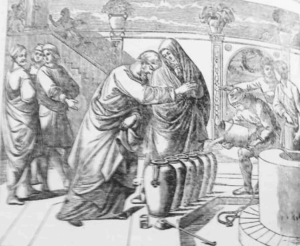
Three days later there was a marriage in Cana of Galilee and Mary and Jesus were invited. The marriage feast lasted 7 days and when they ran out of wine the ruler of the feast was greatly embarrassed but Mary had such confidence in Jesus that she said to the servants, “Whatsoever He (Jesus) saith unto you do it” and when they did, the six large water pots were filled with water and became new wine. This was Jesus’ first miracle.
From Cana Jesus returned to Galilee and began to preach and to heal the sick. Then he returned to Nazareth and as usual he attended the synagogue on the sabbath day and read the scriptures. The place Jesus read that sabbath was Isaiah 61:1- 2 which was a prophecy that Messiah would be filled with the Spirit of God and heal the sick. But when He expounded the scripture He told them,
This day is this scripture fulfilled in your ears!
and they were “filled with wrath” and took Him out of the city and would have cast Him over a cliff, but He, “passing through the midst of them went His way” (Luke 4:30). A sword passed through Mary’s soul as she saw her Son rejected by the Jews, her neighbours and friends to whom Jesus had ministered for years at Nazareth and so the family moved away from Nazareth to Capernaim by the Lake Galilee. It was at Galilee that Jesus chose His disciples and where Jesus did many miracles. Large crowds attended His preaching. We read that
his fame went throughout all Syria: and they brought unto him all sick people that were taken with divers diseases and torments, and those which were possessed with devils, and those which were lunatick, and those that had the palsy; and he healed them. And there followed him great multitudes of people from Galilee, and from Decapolis, and from Jerusalem, and from Judaea, and from beyond Jordan (Matthew 4:24 -25).
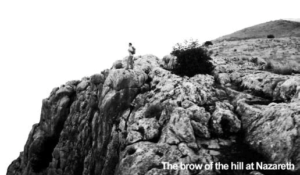 The Jews in Jerusalem heard of the mighty works that Jesus performed and sent men to Galilee to report on what Jesus was doing.
The Jews in Jerusalem heard of the mighty works that Jesus performed and sent men to Galilee to report on what Jesus was doing.
Who Is My Mother?
We are not told much about the part Mary played during the days of Jesus’ ministry in Galilee but we know that there was a band of women who “when He was in Galilee, followed Him, and ministered unto Him” (Mark 15:41). On one occasion when Jesus was talking to the people in a house He was told
Thy mother and thy brethren stand without, desiring to speak with thee. (Matthew 12:47)
This was at a time when opposition to Jesus had been growing and
the Pharisees went out, and held a council against him, how they might destroy him (Matthew 12:14).
The Pharisees had just accused Jesus of “casting out devils by Beelzbub the prince of the devils” (Matthew 12:24) and Jesus had warned them of blaspheming the Holy Ghost; He denounced that generation and said it was “evil and adulterous” and said that the “men of Nineveh shall rise in judgment with this generation and condemn it!” (Matthew 12:41).
It was in this context that Jesus’ brothers, sisters and Mary wanted to speak with Him. When there was a feast of the Jews in Jerusalem they urged Him to go saying,
If thou do these things , shew thyself to the world (John 7:4)
John tells us that Jesus’ brethren “did not believe in Him” (John 7:5)
So when Mary and her sons wanted to speak to Jesus He said,
Who is my mother? and who are my brethren? And he stretched forth his hand toward his disciples, and said, Behold my mother and my brethren! For whosoever shall do the will of my Father which is in heaven, the same is my brother, and sister, and mother (Matthew 12:48-50)
Was Mary swayed by her four sons? It seems that Jesus’ brethren were wanting to correct Jesus and to tell Him to tone down His statements and avoid controversy. As brothers who had lived with and been supported by Jesus for years, they of all people, should have been convinced that Jesus was the Son of God. They were not acting as His brothers. They were not doing the will of God!
Mary STOOD by the Cross
We don’t know whether Mary was there that day to restrain Jesus or whether she came to control her four sons but we do know that when Jesus was crucified, Mary was present with women from Galilee and with the apostle John. We read: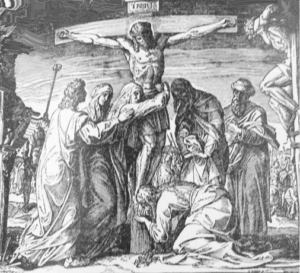
Now there stood by the cross of Jesus his mother, and his mother’s sister, Mary the wife of Cleophas, and Mary Magdalene (John 19:25)
To stand before the crowd with her Son in His hour of suffering and to watch those who passed by “revile Him, wagging their heads ”…” and saying, Thou that destroyest the temple, and buildest it in three days, save thyself. If thou be the Son of God, come down from the cross”; that was a sword piercing her soul just as Simeon had prophesied.
Mary recalled that Gabriel had told her Jesus would be given “the throne of His father David. And He shall reign over the house of Jacob for ever; and of His kingdom there shall be no end”, but now she stood before Him stretched upon a Roman cross; a crown of thorns pressed into His brow and He was mocked by the Chief Priests of Israel who cried,
He saved others; himself he cannot save. If he be the King of Israel, let him now come down from the cross, and we will believe him. He trusted in God; let him deliver him now, if he will have him: for he said, I am the Son of God (Matthew 27:42-43).
Even the thieves who were crucified with Jesus joined the mocking crowd and said,
If thou be the Christ, save thyself and us (Luke 23:39)
but when Mary looked up she saw a sign nailed to the cross above Jesus’ head, “This is Jesus of Nazareth, the King of the Jews”.
How could Gabriel’s promise be true? Mary knew she had conceived by the Holy Ghost and Elizabeth had testified that Jesus was her Lord. The shepherds; the wise men; Simeon and Anna all confirmed the promise that Jesus would reign over the nation of Israel and Mary must cling to the promise of God. Then too, Jesus had said on several occasions that He would die and rise again on the third day. Her faith was reassured in the expectation that after Jesus died he would rise again.
Resurrection was something nobody had ever witnessed before and little was said about it in the Old Testament yet faithful Jews believed that there would be a resurrection in the last days (John 11:24). Jesus had taught that there would be “a resurrection of life” and “a resurrection of damnation” (John 5:29) and that He would be the judge!
In fact Jesus had said that
The hour is coming, AND NOW IS, when the dead shall hear the voice of the Son of God: and they that hear shall live (John 5:25).
A resurrection of “some” from the grave was imminent and if Jesus was the Son of God then it would be He who would call them forth in resurrection bodies. And if Jesus was to call the dead from the grave then He too must be raised from the dead! All these thoughts must have been coursing through Mary’s mind but they in nowise lessoned the agony of seeing her son hang from a Roman cross. The words of Simeon echoed in her mind; “a sword shall pierce through thy own soul” thus confirming all the promises made to her by Gabriel.
Mary was not present when Joseph of Arimathea and Nicodemus took the body of Jesus down from the cross and laid it in Joseph’s tomb for John had taken Mary to his own home. We are not told when Mary first saw Jesus after He rose from the tomb however the women from Galilee who first saw Him, would no doubt have told her.
When Jesus rose, the Old Testament saints arose and some appeared in Jerusalem – which ones we are not told. Did Joseph Mary’s husband appear to her? or did the prophet Simeon or perhaps Anna? There must have been some occasion when Jesus appeared to His family for on the day of Pentecost Mary and Jesus’ brethren were all present in Jerusalem with the disciples. Two earthquakes, the three hours of darkness, and the Centurion’s declaration that, “Truly this man was the Son of God” when Jesus dismissed His spirit, may have made them realize that their brother, Jesus of Nazareth, was the Christ of God and the Saviour of the world.

